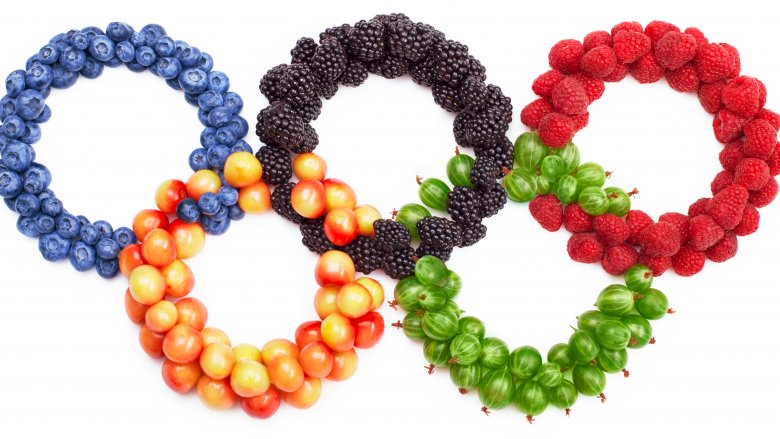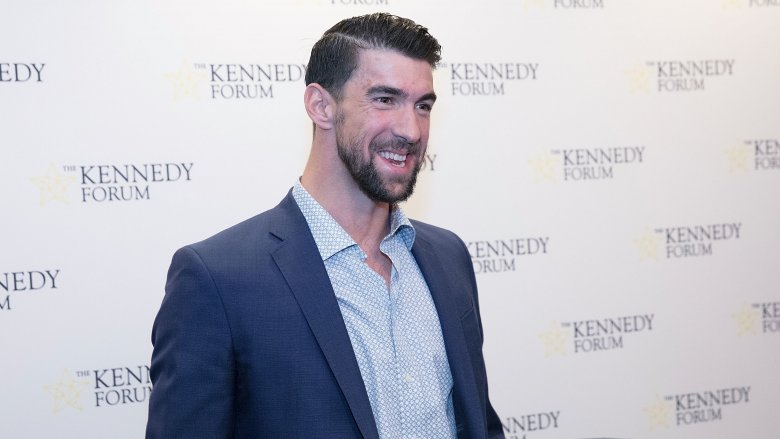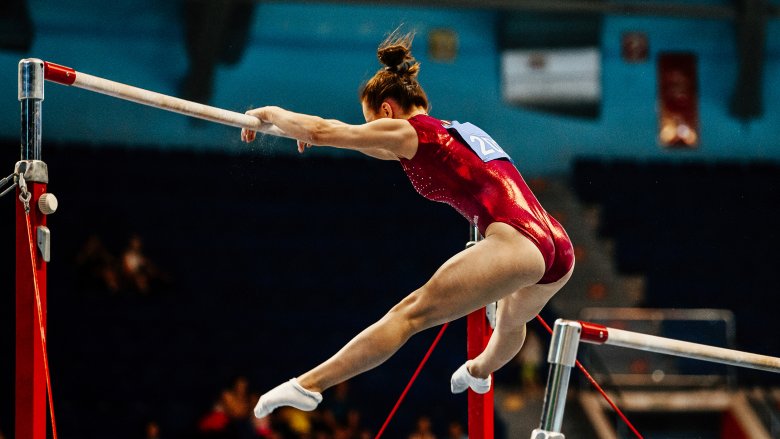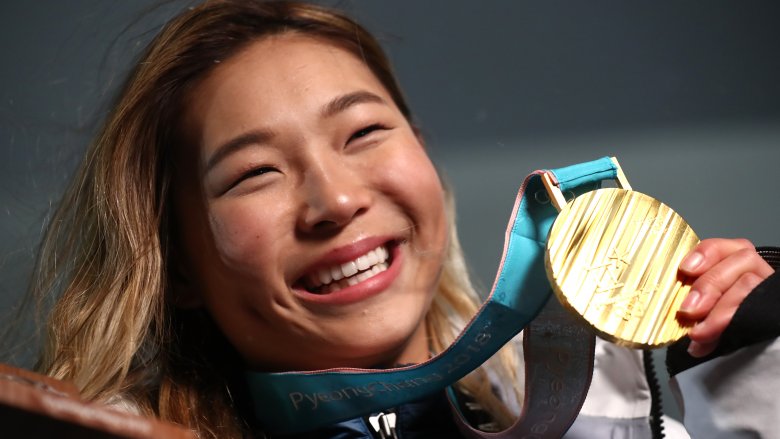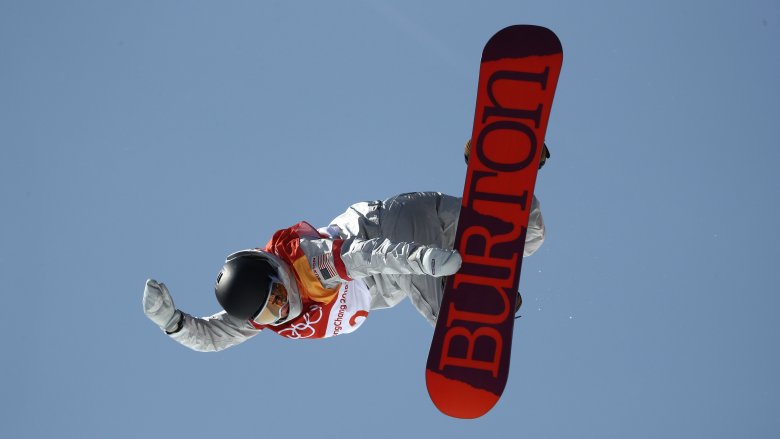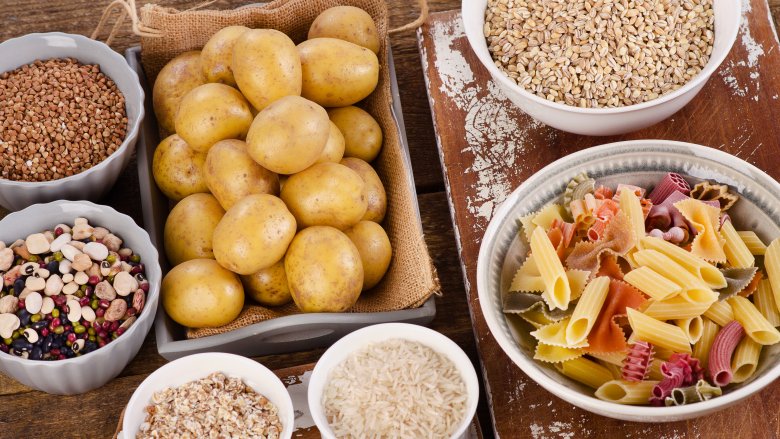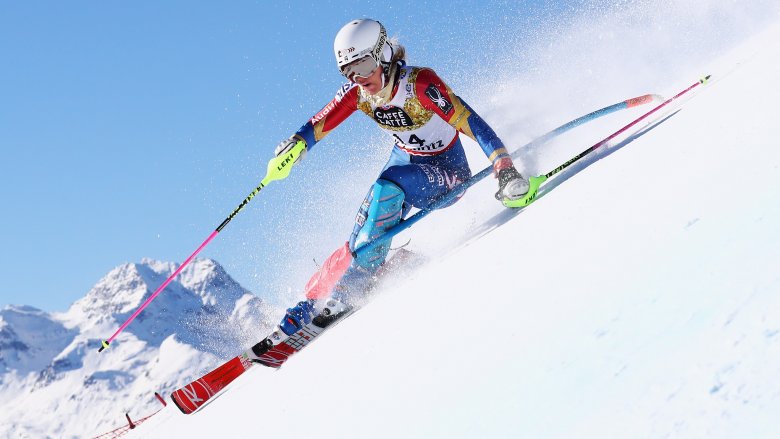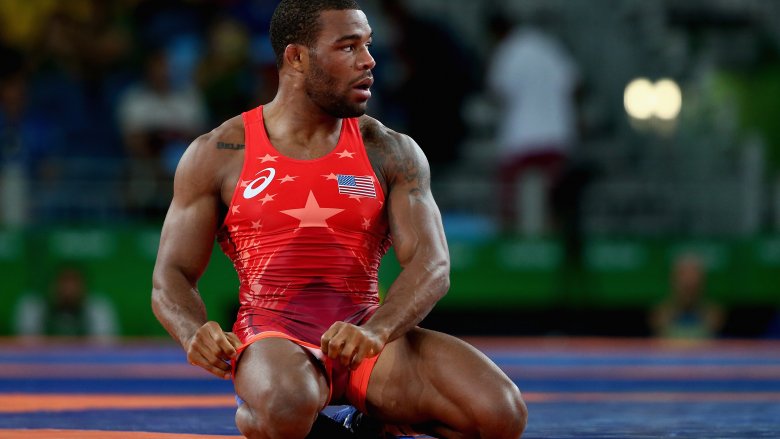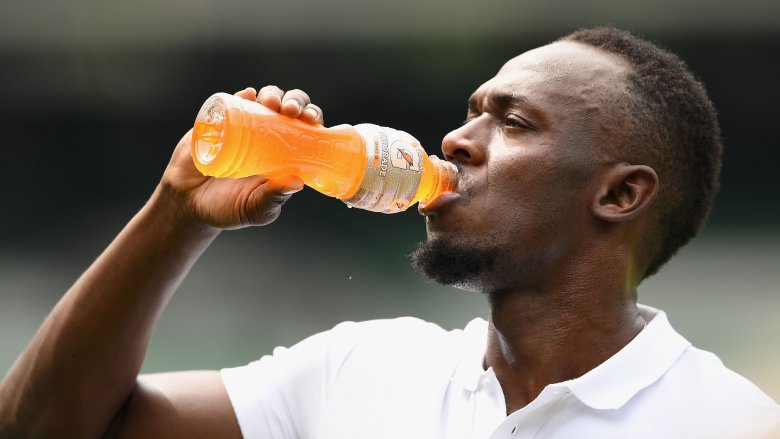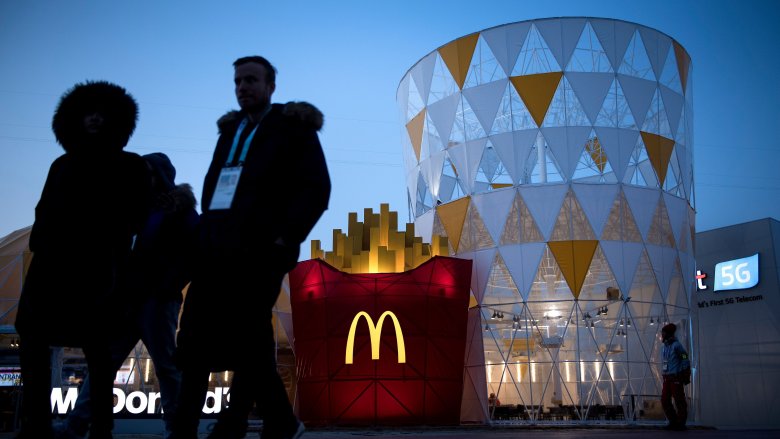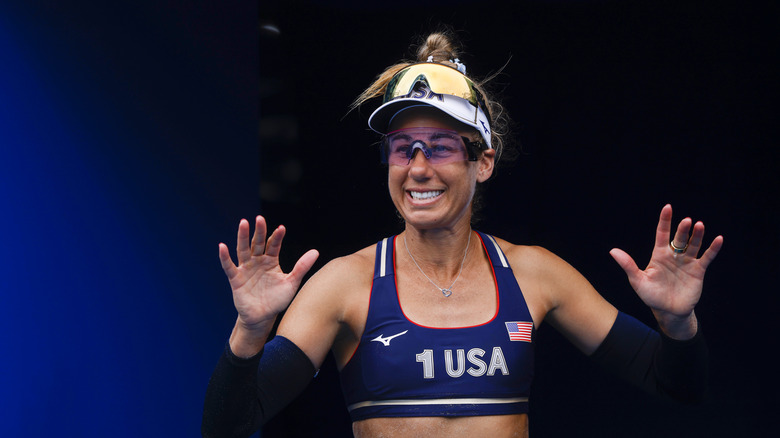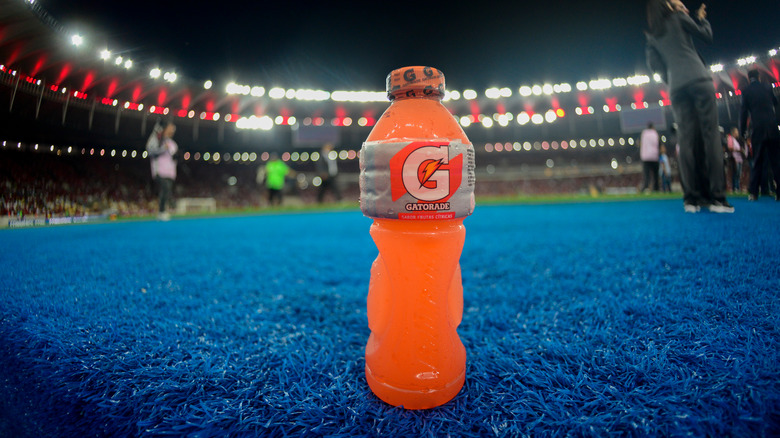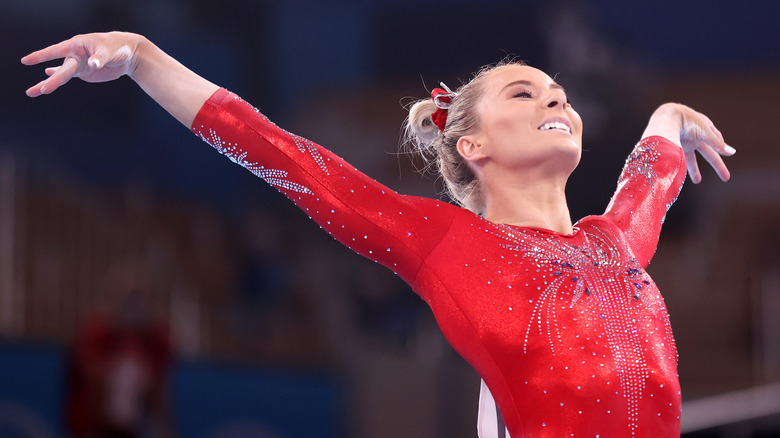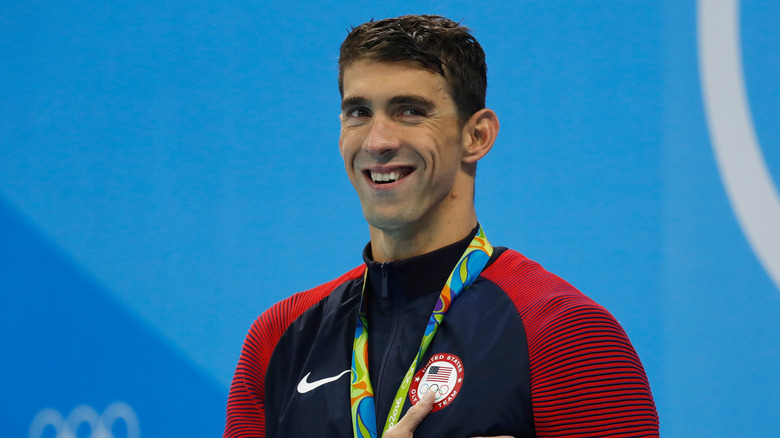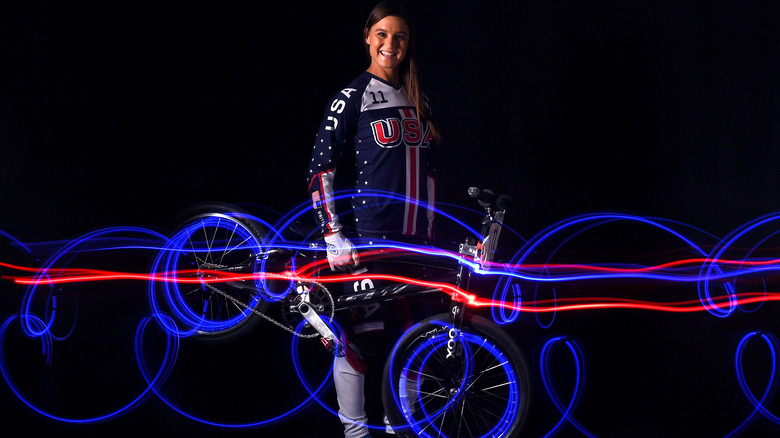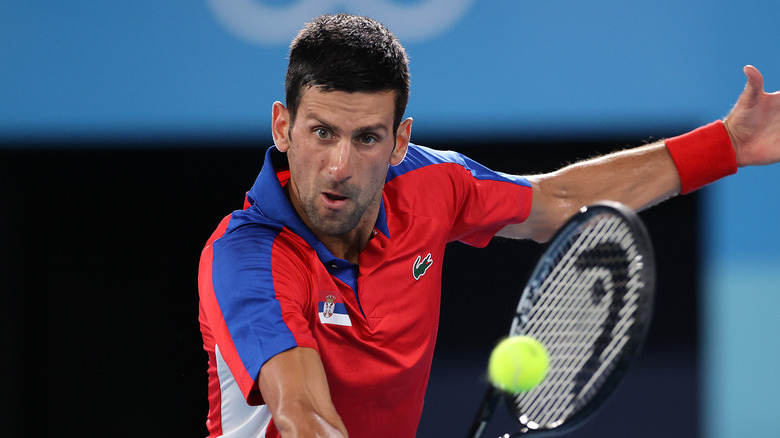What Olympic Athletes Really Eat
When you're a world-class, Olympic athlete, it's your full-time job to keep your body in peak condition. And whether you're hitting the slopes, the pool, or the mat, managing your nutritional needs becomes just as important as training for a medal-worthy athletic performance. Olympic athletes often maintain not just rigid exercise and training routines but incorporate special diets into that training. After all, while noshing on cheeseburgers might seem tempting, diverging from that specialized diet even a little bit could mean the difference between history-making Olympic glory and becoming just a footnote in the sports history books.
The diets of Olympians can also be as varied as the sports themselves. Obviously, a weightlifter and a sprinter are going to have different nutritional needs in preparing for the Games. So what does a typical Olympic athlete actually eat in a day? The answers can fluctuate widely — and some of them might surprise you.
Some athletes eat a ton of calories
Olympic swimmer Michael Phelps made headlines before the Beijing games when he talked about his jaw-dropping, 12,000 calorie a day diet. He has since admitted that amount might have been a bit exaggerated, but he still gets in a great deal more than the average person when he's training or competing, often consuming an entire pound of pasta in one sitting.
Why the ridiculous amount of calories? Swimming is an endurance sport, along with cycling, distance running, speed skating, and cross country skiing. An endurance sport requires the athlete to have a constant supply of energy that won't run out in the middle of hours-long training sessions or a big event. Sport physiologist and nutritionist, Trent Stellingwerff, of the Canadian Sports Institute told Vox that some of the rowers he works with eat between 8,000 and 10,000 calories per day, adding, "... many of them are over 6 feet, 5 inches and 220 pounds and train between 20 and 30 hours per week."
Other sports that require packing in the calories? Team sports like soccer, and power sports like weight lifting. But even those athletes don't get to enjoy the Bacchanalian feast that endurance athletes do. Team and power athletes are more likely to tap out at the 5000 calorie range per day.
Some athletes eat a lot less
It isn't all five-egg omelettes and entire pizzas over at the Olympic village. On the opposite end of the calorie spectrum we have our aesthetic sports, like gymnastics and diving, and our weight-class sports, like wrestling and fencing.
For aesthetic athletes, body weight can be a huge factor in how quickly they can lift and maneuver themselves on the parallel bars, or twist their bodies while diving into the water. The action also tends to be very stop and go, as each event lasts only minutes (or even moments). Typical calorie needs for an aesthetic athlete hover between 2000 and 2,500 per day.
For athletes in weight-class sports, who may not even qualify for their event if the scale doesn't cooperate, diets are managed and finagled in a way to achieve performance-level results. Calories are kept as low as 1,200 per day before weigh-ins.
Breakfast is key
When Real Simple spoke with three Olympic gold medalists about their diets, they agreed on one thing — skipping breakfast is never an option. According to gymnast Gabby Douglas, "Breakfast is the most important meal of the day! You can't expect to perform at your best if you don't take good care of your body."
While most athletes may see eye to eye when it comes to the importance of the first meal of the day, they may not all agree on what that breakfast includes.
Snowboarder Chloe Kim told Pop Sugar that her day might start off with chocolate pancakes, biscuits and gravy, toast, and cottage cheese. Figure skater Alex Shibutani keeps things a bit lighter with oatmeal and chia seed bars. Winter Olympic golden girl, Lindsay Vonn, makes sure to have her personal chef in tow, who may prepare her scrambled eggs with veggies and hot sauce, along with some oatmeal for extra-heavy training days.
Power up with protein!
Olympic athletes are expected to be a lot stronger than the average person, with the physiques and muscle definition to prove it. So it won't be any surprise that many athletes stress the importance of high-quality protein in their diets, which not only promotes muscle growth, but also provides the amino acids essential for recovery after a grueling day of competition.
Heptathlete Katarina Johnson-Thompson tells Cosmopolitan, "As an athlete you need a lot of protein. I try to have 70g of protein a day so I try to add it in to every meal where I can." Katarina typically starts her day with a protein powder based shake, or eggs on toast, and also follows her workouts with a protein-packed snack.
Snowboarder Kelly Clark always makes sure to have a protein bar in her pocket when she's training, so she can keep her energy up after a workout. She also enjoys post-workout snacks like chocolate milk, or toast with almond butter, which she follows up with a dinner of chicken or red meat with pasta or sweet potatoes.
Some athletes carb-load
Carbohydrates convert to glycogen in the body, and are the body's preferred source of fuel, whether you're a world-class athlete or a dedicated couch potato. Our bodies are only able to store so much glycogen in our muscles, however, before stores run out, and the body must turn to other, less efficient sources for continued energy.
That's where carb-loading comes in. For endurance athletes, like runners and swimmers, carb-loading is an important dietary tactic that aims to store extra glycogen in the muscles, to push them through their rigorous training or competitions, and avoid "hitting the wall." Loading up on carbs begins in the day or two prior to a big event, as relying on just a big pancake breakfast on game day won't be enough to cut it.
Runner's World advises that athletes load properly, eating small meals that are carb-heavy, but don't include too much fiber, which could affect digestion. Typical carb-loading meals may include bagels with jam, fruit juices, granola bars, baked potatoes, and oatmeal cookies.
Healthy fats are important
Talking about protein and carbs are the norm when discussing an athlete's diet, but fat can be just as important to their nutrition plan.
According to SF Gate, when it comes to moderate or intense athletic training, both carbohydrates and fat are integral for athletes to achieve their best performance. Fat intake is directly related to the production of steroid hormones that aid performance as well as recovery, and can also regulate inflammation in the body.
Alpine skier, Resi Stiegler, told ABC News that fats in her diet also help her maintain healthy hair and skin when she's out training in the harsh weather conditions. Lucky for her, the US Ski and Snowboard team travels with a crew of dieticians and chefs who feed them well with dishes like miso-ginger salmon, teriyaki stir-fries, fish tacos with feta cheese and guacamole, and take-along snacks loaded with fat-fueled ingredients like coconut, nut butters, and chia seeds.
Clean eating has become the standard
While most of us relish the stories of athletes like Michael Phelps downing entire pizzas and fried egg sandwiches to get into swimsuit shape, Vox reported that the reality is that far more athletes are now relying on a clean eating regimen to fuel their workouts. Says sports nutritionist, Asker Jeukendrup, "There's been a change in the last few years where athletes have become more serious about thinking about what they're putting into their bodies."
For US women's soccer player Julie Johnston, clean eating means not focusing so much on calories, but on the nutrition she's putting in her body. Julie makes sure to get in plenty of fresh fruits and veggies, and her training lunch is likely to include a fresh smoothie and some chicken soup.
For a weight-class athlete like wrestler Jordan Burroughs, getting inadequate nutrients can be challenging when trying to keep total daily calories down in order to make weight. His go-to lunch is a freshly-squeezed juice of beets, kale, turmeric, and ginger.
Junk food isn't always off the table
Athletes are, of course, human too, and that means some of them just love their junk food. While most Olympians stick to their prescribed dietary regimen when training, they do look forward to cheat meals, or celebratory sweet treats after a big event.
Bobsledder Aja Evans told Boston.com that she always carries her favorite European chocolate bars and sour apple ring candies in her bag to indulge after a race. Nordic skier Sadie Bjornsen reported that her favorite cheat meal is a pile of nachos. For heptathlete Katarina Johnson-Thompson, it's Doritos, which she says are "addictive."
And of course, there's the now-infamous story of Usain Bolt managing to win three gold medals in Beijing while eating nearly a thousand Chicken McNuggets, all because the food served in host country China didn't appeal to him. Time quoted Bolt from his autobiography, Faster than Lightning, "Man, I should have gotten a gold medal for all that chowing down."
Hydration is essential
The U.S. Olympic Committee takes hydration very seriously, stressing the importance of adequate hydration for minimizing muscle cramps, supporting immune defense, and enhancing mental function and motor control.
Athletes are encouraged to monitor their hydration levels daily, and to watch for signs of dehydration like fatigue, nausea, headache, or elevated heart rate. Fluid needs vary greatly depending on each athlete, but are even higher for competitors who are traveling, or subject to increased altitudes or temperatures.
To increase fluids, the committee recommends that athletes consume at least two cups of water at every meal, as well as fruit juices, herbal teas, and foods that are high in water content, like fresh fruits and vegetables. They also advise some salty snacks for those athletes who tend to sweat more than others.
Chris Mazdzer, who competes in Olympic luge, told Delish that water, not coffee, is what he uses to wake up in the morning, "It's the elixir of life — during sleep you lose water and your cells always need to be replenished."
What's it like to eat in the Olympic Village?
Ever wonder what it's like to chow down in the Olympic village? For the winter PyeongChang games, the dining halls are open 24 hours per day, and offer an 18-page menu of delectables that will satisfy the dietary needs, or cheat meal cravings, of athletes from the world over.
Highlights include an abundant salad bar, a pizza and pasta bar, a coffee station with breads and muffins, and specialized selections like kosher, halal, and vegan meals. Regional Korean dishes will of course be on-hand for competitors looking to get their bimimbap or kimchi fix. And yes, in case you were worried, McDonald's will be served at the main hall. Athletes can enjoy a Big Mac alongside Korean McDonald's favorites like shrimp and beef burgers, or waffle fries.
Moderation is sometimes the key
As the old saying goes, "Everything in moderation." It turns out, quite a few Olympians live by this code. Team USA's volleyball star April Ross is one of them. In an interview with Yahoo! News, the athlete explained that she had tried countless fad diets and eating routines. In the end, she realized that taking a more moderate approach was far more effective. As she put it, "... the thing that I've just concluded is 'everything in moderation' is the best way to go."
Alice Willoughby, a BMX racer, is also on team moderation. "'Everything in moderation' is a good approach because you need it all," she told Delish. In other words, why complicate things? Going for a balanced diet is always the best bet.
Katarina Johnson-Thompson, the British track star, is yet another athlete who aims for a balanced, moderate diet. Instead of cutting anything out of her diet, she told Cosmopolitan, she aims to get the right amount of everything. We're starting to think these athletes might be onto something!
Lots of Olympians love their Gatorade
As most people with a television probably know, Gatorade has made a name for itself as the drink of choice for Olympians as it promises to refuel you post-workout. While you may have assumed this was all a marketing ploy, it turns out, some Olympians really do love this energy drink. April Ross, an American volleyball player, told Yahoo! News, "When I do experience those lulls of training when I push myself really hard, Gatorade is magic, so I'm always refueling with Gatorade. The extra electrolytes hit the spot!" And, in 2012, Gatorade made an advert that showed Usain Bolt eating a Gatorade Chew bar (via The Drum). The brand also sponsors runner Sydney McLaughlin and baseball player Bryce Harper.
Some athletes, however, opt for a different drink to refuel after competing. According to NPR, Bavarian and German Olympians have recently taken to drinking non-alcoholic beer instead!
Olympians don't always count calories
Many people believe that the key to a balanced, healthy diet is getting a certain amount of calories. Some Olympians do count their calories pretty obsessively. Michael Phelps, for instance, is famous for having stuck to a 12,000 calorie diet each day while preparing for the 2008 Olympics (via NPR).
However, not all Olympians are so strict with themselves. MyKayla Skinner, for example, the American gymnast, told Delish that she has "never thought about [counting her calories]." Instead of forcing herself to eat a certain amount, Skinner lets herself eat what she feels she needs to sustain her training. Caeleb Dressel, an Olympic swimmer, is also not a big fan of calorie counting. As he told USA Today, he simply stops eating when he feels full. "If I wasn't swimming, I think that'd be a problem," he joked. Apparently, he probably eats about the same amount as Phelps did.
As sports nutritionist Nancy Clark told Live Science, not counting calories is probably the smartest approach for athletes. As she put it, "The body is the best calorie counter, and these top athletes — they're able to listen to their body."
Some Olympians cut out alcohol
We all know that alcohol isn't that good for you — especially in large quantities. So, it comes as no surprise to learn that quite a few Olympians abstain from drinking while they're in training and while they're at the Games.
Mallory Weggemann is an American Paralympic swimmer who prepared for the 2020 Olympics by completely cutting alcohol out of her diet. "While I don't normally drink much this small shift aids in better sleep, recovery and hydration," she explained to Delish. Michael Phelps is another famous swimmer who decided to go sober. In 2015, he announced that he wouldn't be drinking until after the Rio Olympics. "I've got to put my body in the best physical shape I can possibly get it in," he told Sports Illustrated.
Of course, not all Olympians go dry. Bryan Fletcher, the Olympic skier, told Delish, "even alcohol and sweets have a place in an athlete's diet." In fact, according to The Asahi Shimbun, Olympians at the Tokyo Olympics were able to drink during the competition if they were in their private rooms — clearly, some athletes prefer to abstain, but plenty of these elite athletes don't mind indulging in a drink or two.
Taking vitamins is also key
Taking vitamins is often thought to be a big part of a healthy diet and lifestyle. For Olympians, vitamins can be crucial to performance. Swimmer Mallory Weggeman told Delish that she takes multi-vitamins, vitamin D, vitamin C, fish oil, and a probiotic. Gymnast MyKayla Skinner told the publication that she also takes vitamin C. For BMX racer Alise Willoughby, it's a "multi-vitamin, Vitamin D, Vitamin C, Vitamin B complex, along with a probiotic and magnesium, and zinc."
According to T3, micronutrients are another type of vitamin that is popular amongst Olympians. "Micronutrients should be viewed as the key to the door (macronutrients are the door), in that these vitamins allow you to make the most of your carbohydrates, fats and protein," sports expert Arj Thiruchelvam said.
Some athletes, however, don't bother with vitamins. Runner Steve Soloman, for instance, told Healthy Luxe, "I don't personally take any nutritional supplements as I believe that I have a well-rounded diet and also don't fully believe in a magic pill to solve any deficiencies."
A surprising number of Olympians have gone vegan
Lots of people believe that, while healthy, veganism isn't actually all that helpful for athletes. Why? Because it's so hard to get the right amount of protein. Well, some Olympians have proven that even a vegan diet can provide enough nutrition and energy. The famous Olympic tennis player, Novak Djokovic, told Graham Bensinger that cutting out meat was the best thing he could have done for his career. "I cut out red meat because I had to put a lot of energy and effort into the digestive process. That would take a lot of essential energy I needed for my focus, recovery and the next training session," he said. Instead, he eats fruits, salads, and grains.
Numerous other Olympians also swear by vegan diets. Meagan Duhamel, the figure skater is one example — she apparently went vegan after reading a book on the subject (via CBC). Soccer player Alex Morgan is another. "I never thought it was possible I could be playing at an elite level as a professional athlete with a plant-based diet," she told USA Today. "Then I realized it wasn't detrimental at all."
The athletes love eating Japanese food at the Tokyo Olympics
Sushi, sashimi, tempura — the Japanese certainly have some delicious national dishes. And by the looks of things, the Olympians who are competing at the 2020 Tokyo Olympics absolutely loved all of the Japanese food they ate during their stay. American rugby player Ilona Maher posted a TikTok video that called the gyoza in the Olympic Village the best she'd ever tasted. She also posted a video showcasing deep fried cheese, spring rolls, and ramen.
Volleyball player Erik Shoji was also impressed. In a TikTok video, he tried a variety of sushi rolls and a Japanese curry. "This food is so good!" he gushed. Another Olympian, Dasha Gavrilova, also took to TikTok to show off the Village's wide array of cuisines. The dining hall had food from all over the world including noodles, salads, Japanese, deli food, vegetarian food, gluten-free food, and more. Wow, the food in Tokyo looks seriously delicious.
